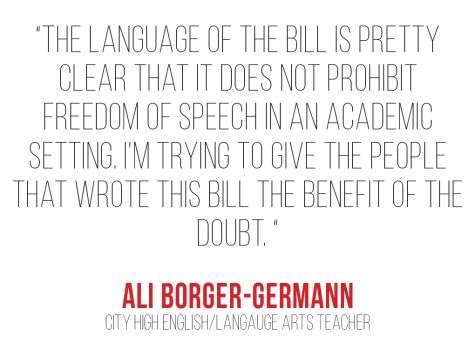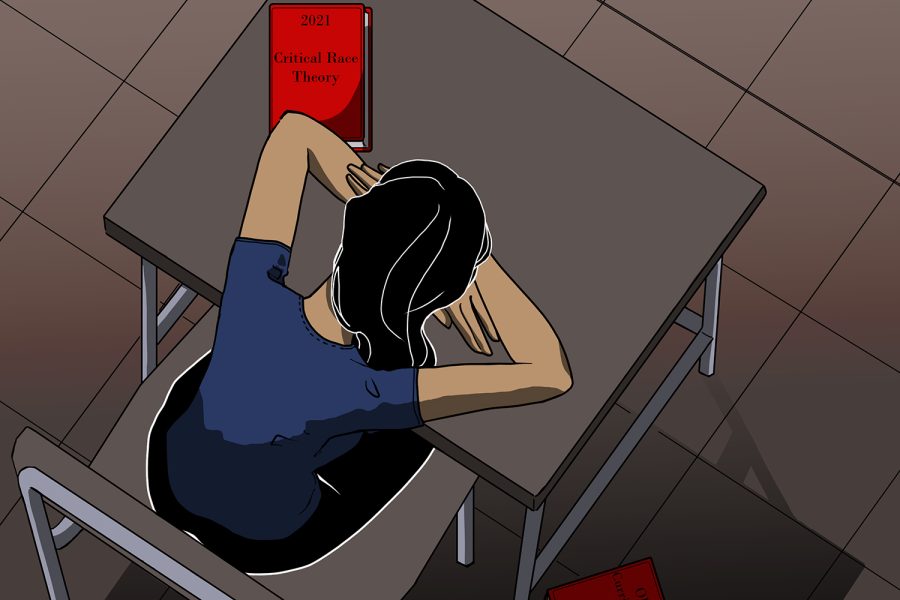Your donation will support the student journalists of Iowa City High School. For 2023, we are trying to update our video and photo studio, purchase new cameras and attend journalism conferences.
Chapter 2: In the Classroom
October 14, 2021
Iowa passed HF802 that limits divisive professional development of teachers and in federal institutions. It doesn’t prohibit freedom of speech in academic institutions.

Ali Borger-Germann, City High teacher, rushed to her computer, the email she was dreading needing to send had finally become necessary. As she reluctantly signs off, a weight is lifted off her shoulders, but what came next was a highly anticipated shift in the education system of ICCSD.
“We’re seeing a lot of increased anxiety and worries, in general. I definitely think that there’s been a lot of questions about the legislation and what it means,” Ali Borger-Germann said.
Critical Race Theory is an education tool developed in the 1970’s. Using a legal framework to explain the United States and global systems, and the intersection of identity and race within them. The legal framework that characterizes the curriculum is not often applied in classrooms. Instead, terms that are often used in those lessons show up in discussions, as well as DEI (Diversity, Equity and Inclusion) training, which is what is currently being prohibited by this bill. Across the nation, bills targeting education and divisive concepts within mandated curriculum have been passed. Iowa’s state legislature has passed HF 802 that was enacted July 1, 2021.
In U.S Congress, Republicans have discussed legislation that would ban “Critical Race Theory’’ being mandated in federal institutions.
“The language of the bill is pretty clear that it does not prohibit freedom of speech in an academic setting. I’m trying to give the people who wrote this bill the benefit of the doubt,” Borger-Germann stated. “I think that they were aware that topics like this do come up in academic study no matter what you’re teaching, especially for social studies and English/ Language Arts.”
The bill was introduced early in the legislative session last year, having been drafted by Republican constituents around the state. Passing through the house with a majority vote, the bill then moved to the Senate, where it was referred to the Education Committee and sponsored by Senator Sinclair.

“A lot of the work that Laura does is still perfectly in line, there’s no conflict. In our first cultural competency training for the year, Laura actually outlined, ‘here are the things that we can no longer talk about, and here are the things we can talk about, and this doesn’t stop us from making progress in racial equity,” Borger-Germann explained. “She was very, very clear about that. And I felt like that was really reassuring.”
Paras Bassuk ‘21 Co-Chairs the Equity Advisory Committee, where Borger-Germann and Laura Gray, Director of Diversity & Cultural Responsiveness, hold seats. The Equity Advisory Committee writes Diversity and Equity recommendations for the school board with school board members J.P Claussen and Charlie Eastham in attendance at all meetings.
“We provide a combination of community perspectives, including teachers, students, community leaders, and any other interested parties that can be on this committee and give their input on district policy issues and other initiatives,” Bassuk ‘21 said when discussing the goals of the Equity Advisory Committee.
Much of the debate focuses around definitions and attempting to answer the question of what bias and education should look like. On the Left, the threat of not being able to mandatorily discuss the effects of systemic racism and its prevalence has caused concern, with confusion on what the possible impacts of this lack of knowledge will have on the next generation. On the Right, liberation from mandatory training about these topics in public school curriculum is freeing people from forcibly being “race and sex-stereotyped”, and promotes learning on how to not be racist as an individual instead of “indoctrination on the system we live in.”
“I continue to educate our teachers and support cultural proficiency with a restorative lens. The thing I won’t say is that Iowa, and/or the United States is fundamentally racist,” Gray stated. “I can refrain from saying this statement and still support diversity, equity, and inclusion in our district.”
In a pattern that has been developing for the past year, Republicans have been writing legislation prohibiting mandatory training on certain topics, mainly systemic racism and sexism, also generalized as “Critical Race Theory’’. In Ohio, HF 322 prohibited statements discussing what founded or represented America, and the concept of “unconscious bias” being taught mandatorily. In Oklahoma, a similar bill has been passed, prohibiting the use of language saying “ there is a conscious or unconscious bias when it comes towards race or sex being inherently oppressive”
“All the large districts in Iowa brought in a law firm to sort of explain ‘here’s what we think might be a problem, here’s what’s not a problem,’” Borger-Germann said. “There’s no precedent, there are no court cases around it yet. [The lawyers] were sort of inventing their own case studies and sort of testing it against the language of the law and then giving us their best interpretation.”
In the ICCSD school climate survey published June 2019, 67% of students in high school felt they had an opportunity to discuss race in the classroom. Non-white students reported significantly lower rates of seeing themselves in the curriculum, with a lack of “inclusive content” reflecting their background and identity.
“This kind of tipping point around discussing issues related to Indigenous peoples in our curriculum. I feel that part of the conversation has really gotten shut down. My kids who are in eighth and ninth grade in American Studies in our district basically have not had any conversations about that, and I don’t know that that’ll ever change now because of this law” Borger-German said.
“That’s part of our democratic process, when there’s something under debate, it’s to- tally legit to talk about it,” Borger-German said. “I wrote letters, I brought it to the district Equity Advisory Committee and asked [for us] to start thinking and planning and maybe advocating against it.”
ICCSD offers Diversity, Equity, and Inclusion (DEI) training according to the Iowa Department of Education Guidance which states, “provided such efforts are consistent with the provisions of this section, chapter 216, and other applicable law”.
Sourcing: the information used in this article is gathered from the Department of Education, as well as the Iowa Legislature Bill Book and Fast Democracy, a non-partisan database. The first part of this piece primarily focuses around House File 802 and then goes on to explore experiences with this new law among the Iowa City Community School District.
